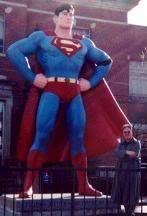| Pop Culture Gadabout | ||
|
Monday, May 29, 2006 ( 5/29/2006 06:50:00 AM ) Bill S. "WE'RE ALWAYS TELLING LITTLE LIES. ALWAYS!" – Been catching up on episodes of Big Love this weekend, and for the life of me I can't see how those culture critics who've been slamming the HBO series for its purported message can assert that the series "endorses" polygamy. Leave aside Harry Dean Stanton's creepy "prophet" Roman Grant and the denizens of his isolated compound, the life led by series' lead Bill Henderson (Bill Paxton, never better at blending a bland exterior with a hint of strange) and his trio of wives is an unending series of deceptions and self-imposed isolation. As the show repeatedly highlights, the life chosen by our extended family – the illusion of normalcy in a suburban Nevada neighborhood – is built on an extremely rickety financial foundation, one sustained through a mountain of debt and capable of instantly collapsing should word of Bill's multiple marriages become public in Salt Lake City. And though Paxton's hubby is presented as a nicer guy than either his father Bruce Dern (who's like the immature thug from Support Your Local Sheriff rendered even more childish with age) or Roman, he still has his moments of patriarchal heavy-handedness (as when he gets enraged over second wife Chloe Sevigny's compulsive overspending – this show has middle-class debting as one of its central motifs). Too, the only spouse with sure legal and financial footing in the home is Jeanne Tripplehorn's Barb, the levelheaded first wife. Neither Sevigny's Nicki nor young wife Margene (Ginnifer Goodwin) have any legal rights should their hubby pass on, and though the family attempts to resolve this with a set of wills, it's clear this won't be sufficient should the worst happen. Even the men's mag fantasy of living with Three Hot Wives proves a double-edged situation – as our hero nearly overdoses on Viagra in his attempt at keeping all three spouses happy. In short, though it focuses on making its characters as recognizably human as the gang in HBO's flagship drama, The Sopranos, the show doesn't endorse its peoples' choices. It examines them. Of course, to a certain breed of cultural critic even acknowledging something exists is tantamount to supporting it. In their willful shortsightedness, they're like Rhonda, the little 14-year-old (and future wife to Roman – Ick!), who is so blinkered by her beliefs that she describes Long Day's Journey into Night as a play about "this family that's miserable because God's punishing them." Don't think that's exactly what Eugene O'Neill had in mind, Rhonda, but with this kinda cultural criticism, projection is everything . . . # | |
|
|

